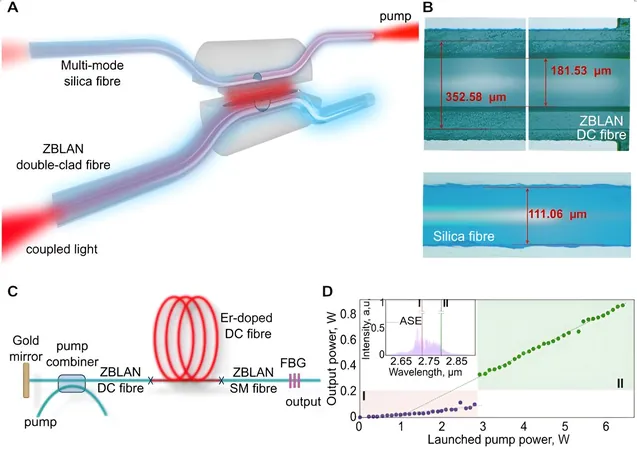
Revolutionary Discovery: Tiny Marine Creatures Unveil Mysterious Mucus Parachutes That Could Change Climate Change Strategies!
2024-10-10
Author: Noah
Recent groundbreaking research led by Stanford University has revealed an astonishing phenomenon that could dramatically reshape our understanding of how the oceans combat climate change. Published on October 11 in the journal Science, the study uncovers the existence of unique parachute-like mucus structures created by microscopic marine organisms that significantly decelerate their sinking rate. This crucial finding may lead to revised calculations regarding the ocean's ability to absorb atmospheric carbon dioxide.
The implications of this discovery are profound. According to Manu Prakash, the study's senior author and an associate professor at Stanford's School of Engineering and Doerr School of Sustainability, "We haven't been looking the right way." This statement highlights the need for reevaluating how scientists study the natural processes vital to climate mitigation.
What is the Biological Pump?
The process known as the biological pump refers to the ecosystem mechanism through which marine snow—a combination of decomposed phytoplankton, bacteria, and fecal matter—absorbs a staggering one-third of anthropogenic carbon dioxide from the atmosphere. This organic matter then sinks to the ocean floor, effectively removing carbon dioxide from the immediate environment for ages.
Yet the exact mechanics of how this sinking process occurs had remained largely enigmatic—until now. The research team, utilizing a novel rotating microscope that mimics ocean conditions, was able to observe marine snow in real-time during expeditions across the world’s oceans, from the Arctic to Antarctica.
Observing in Real-Time: A Game Changer
During a recent expedition in the Gulf of Maine, scientists collected samples of marine snow and analyzed their behavior using this pioneering microscope. The findings were eye-opening: they discovered that marine organisms often produce mucus structures that resemble parachutes. This mucus can significantly prolong the organisms' residence in the upper layers of the ocean—increasing it by nearly 100%.
This extended suspension enhances the likelihood of other microbes breaking down the organic carbon found in marine snow, potentially releasing carbon back into ocean waters and impeding the vital process of carbon dioxide absorption from the atmosphere.
A New Perspective on Marine Ecosystems
The study asserts the importance of direct observation in natural environments as pivotal to grasping the complex interactions within ecosystems. "Theory tells you how a flow around a small particle looks like, but what we saw on the boat was dramatically different," stated Rahul Chajwa, lead author and postdoctoral scholar. The research underscores the necessity of stepping outside the laboratory to capture the intricate and often hidden dynamics of life.
The findings reveal that for two centuries, scientists have primarily viewed planktonic life in two dimensions under microscopes, sidelining the complex environments in which these organisms thrive.
What's Next?
The researchers are committed to refining their models and compiling their findings into a global dataset that will provide unprecedented insights into marine snow sedimentation dynamics. This dataset is expected to be the largest of its kind, incorporating data collected from six major oceanic expeditions. They also plan to investigate additional influences on mucus production, such as environmental stress factors and the presence of certain bacteria species.
While this discovery might alter how scientists think about critical tipping points for oceanic carbon sequestration, there remains a glimmer of hope. During another recent expedition off Northern California, researchers observed processes that could potentially accelerate carbon sequestration, further enriching their understanding of marine ecosystems.
As Prakash puts it, "Every time I observe the world of plankton via our tools, I learn something new." The implications of this research are vast, as understanding these micro-scale phenomena may hold the key to tackling global climate challenges with innovative solutions.
Stay tuned—we’re just scratching the surface of how tiny organisms can impact our planet's health!









 Brasil (PT)
Brasil (PT)
 Canada (EN)
Canada (EN)
 Chile (ES)
Chile (ES)
 España (ES)
España (ES)
 France (FR)
France (FR)
 Hong Kong (EN)
Hong Kong (EN)
 Italia (IT)
Italia (IT)
 日本 (JA)
日本 (JA)
 Magyarország (HU)
Magyarország (HU)
 Norge (NO)
Norge (NO)
 Polska (PL)
Polska (PL)
 Schweiz (DE)
Schweiz (DE)
 Singapore (EN)
Singapore (EN)
 Sverige (SV)
Sverige (SV)
 Suomi (FI)
Suomi (FI)
 Türkiye (TR)
Türkiye (TR)